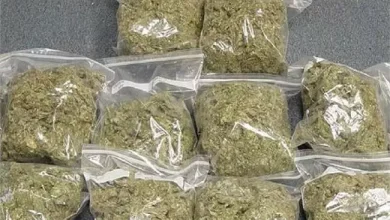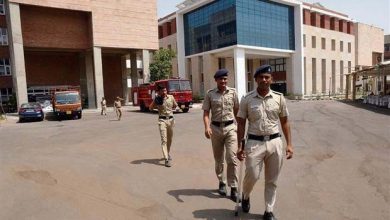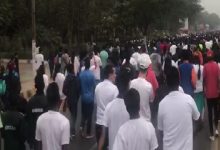Delhi took a sigh of relief after the rain

New Delhi: Delhi heaved a sigh of relief on Friday as intermittent rains cleared the suffocating smog that had persisted for over 10 days and the city’s AQI improved by over 150 points.
The national capital’s 24-hour average air quality index (AQI), recorded at 4 pm daily, stood at 279, a significant improvement from 437 on Thursday.
The air quality in the city ranged from ‘very poor’ to ‘severe’ for two weeks starting October 28. An AQI between zero and 50 is considered ‘good’, between 51 and 100 ‘satisfactory’, between 101 and 200 ‘moderate’, between 201 and 300 ‘poor’, between 301 and 400 ‘very poor’, 401 And between 450 is considered ‘severe’ and above 450 is considered ‘severe’. ‘Serious Plus’.
The air quality is expected to improve further as the wind speed becomes favorable for the dispersion of pollutants. The AQI at any given time is the average of readings taken over the past 24 hours.
The Safdarjung Observatory, the primary weather station in Delhi, recorded 6 mm rainfall in the 24 hours ending 8.30 am on Friday and 4.2 mm rainfall between 8.30 am and 5.30 pm, the India Meteorological Department (IMD) said.
According to the data of the Meteorological Department, light rain was recorded in most areas of Delhi. Kuldeep Srivastava, a senior IMD scientist, said most parts of northwest India, including Punjab, Haryana and western Uttar Pradesh, recorded rainfall since Thursday night.
The IMD had earlier predicted a marginal improvement in air quality just ahead of Diwali due to favorable meteorological conditions including light rain.
IMD officials had also said that the change in wind direction from northwest to southeast due to the fresh western disturbance affecting northwest India will help in reducing the contribution of smoke from stubble burning.
Srivastava said, once the Western Disturbance passes, the wind speed will increase to around 15 kilometers per hour on November 11 (Saturday), which will help in dispersing the pollutants before Diwali (November 12).
Last year, reduction in stubble burning incidents, delay in rains and early arrival of Diwali along with favorable meteorological conditions had prevented the national capital from turning into a gas chamber after the festival.
According to data from Decision Support System, a numerical model-based framework capable of identifying sources of particulate matter pollution in Delhi, stubble burning accounts for 38 per cent of air pollution in neighboring states, especially Punjab and Haryana. City on Wednesday.
It was 33 percent on Thursday and is likely to be 16 percent on Friday. The data also shows that transport is another major factor, contributing 12 to 14 percent of Delhi’s poor air.
Vinay Kumar Sehgal, principal scientist at the New Delhi-based Indian Agricultural Research Institute, has predicted a reduction in the incidence of field fires in Punjab and Haryana by two to three days due to humid conditions after the rains.
In view of the worsening air pollution, the city government is planning to cause artificial rain on November 20-21 through cloud seeding.
The Delhi government on Wednesday rescheduled the December winter holidays of all schools. Winter vacation will now last from 9 to 18 November.
Delhi Environment Minister Gopal Rai on Friday said the government has postponed the implementation of the odd-even car rationing scheme as the city’s air quality has significantly improved due to rains.
Addressing a press conference, he said the government will review the air quality situation after Diwali and an odd-even scheme may be considered if there is a sharp rise in pollution levels.
Rai had earlier said that the scheme would be implemented in the city after the Supreme Court reviews its effectiveness and issues orders.
On Tuesday, the top court questioned the effectiveness of the Delhi government’s car-rationing scheme aimed at curbing vehicle pollution, calling it “all optics”.
Anticipating further deterioration in air quality after Diwali, Rai on Monday announced that the key scheme, which allows cars to operate on alternate days depending on the odd or even last digit of their registration number, will be scrapped on 13 Will be implemented between 20th November.
Doctors say breathing Delhi’s polluted air is equivalent to the harmful effects of smoking about 10 cigarettes a day.
He said long-term exposure to high levels of pollution can cause or worsen respiratory problems such as asthma, bronchitis and chronic obstructive pulmonary disease (COPD) and dramatically increase the risk of heart disease.
Stringent restrictions mandated under the Graded Response Action Plan (GRAP) – the final phase of the Centre’s air pollution control plan for Delhi-NCR – have also been imposed in the national capital.
















